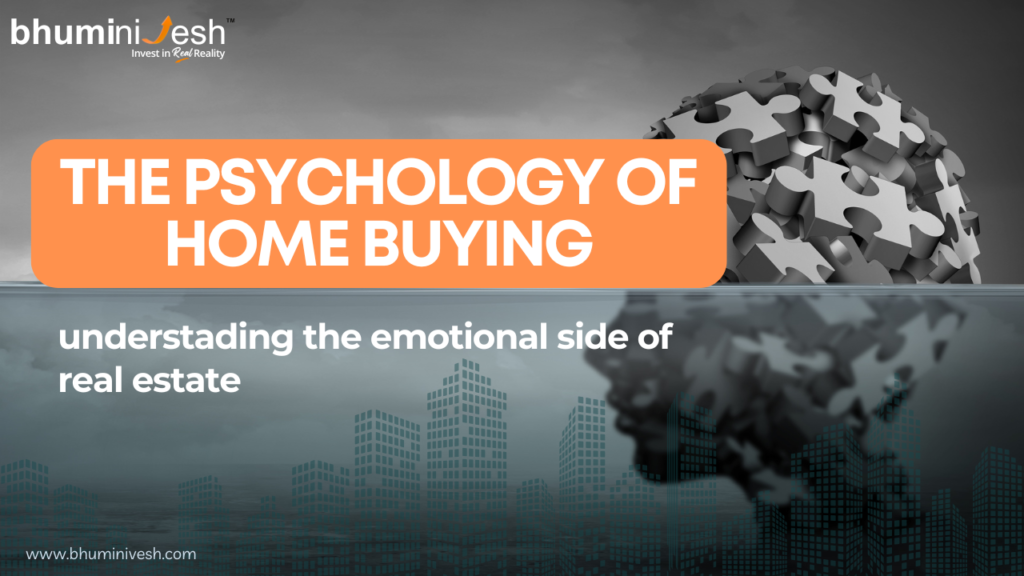

We frequently think about real estate in terms of figures, such as market trends, interest rates, and property valuations. But the emotional aspect of purchasing a home is just as important, if not more so. Both buyers and sellers might benefit from knowing the psychological aspects that influence our choices.

Nostalgia: A Potent Impulse
Real estate decisions are surprisingly influenced by nostalgia, which is the sentimental yearning or nostalgic affection for the past. Many purchasers look for houses that arouse feelings of comfort or familiarity, frequently derived from cultural heritage or early recollections. For example, a buyer may be attracted to a property that shares architectural characteristics with the house they grew up in or to a community that reminds them of their youth.
Attachment: Creating Relationships with Places
We develop sentimental ties to our homes over time. Raising a family, throwing special parties, or just spending time by yourself can all contribute to these attachments. These sentimental ties may make the selling process more difficult. It could be hard for sellers to part with a location that is filled with so many treasured memories.
FOMO: The Need to Take Immediate Action
The fear of missing out on something worthwhile or interesting, or FOMO, can have a big impact on real estate choices. Buyers may feel under pressure to make fast offers in a competitive market out of concern that someone else may take their ideal home. This sense of emotional urgency may cause people to make snap decisions and overpay for real estate.

The Role of Real Estate Brokers
Using psychological insights, real estate brokers can improve client interactions and streamline transactions. The following are some tactics:
Active Listening: Agents can better comprehend their clients’ emotional reasons by actively listening to their needs, wants, and worries.
Empathy: By demonstrating compassion and empathy, agents can establish an emotional connection with their clients and foster rapport and trust.
Storytelling: Telling tales about a property’s past or the possibility of future recollections can stir feelings and forge closer bonds.
Framing: Agents have the ability to present facts in a way that emphasizes a property’s advantages, such as its capacity to foster a feeling of community or its room for expansion.
Managing Expectations: Agents can assist customers in preventing dissatisfaction and disappointment by establishing reasonable expectations and resolving any obstacles.
Advice for Purchasers
Self-Awareness: Recognize your own prejudices and emotional triggers.
Seek Professional Assistance: To deal with emotional difficulties, think about speaking with a therapist or counselor.
Put Needs Before Wants: Pay attention to a home’s useful features, like its location, size, and condition.
Make a budget and follow it: Steer clear of emotionally driven snap decisions.
Take Breaks: If you’re feeling overburdened or anxious, take a break from the procedure.
To assist you in making a selection, picture yourself and your family in the new house.
Buyers, sellers, and real estate agents can successfully negotiate the emotional intricacies of the process by being aware of the psychological aspects that affect real estate decisions.

Role of Social Media in Real Estate
Social media now plays a crucial role in the home-buying process, impacting everything from closing transactions to property searches. Social media has the following significant effects on home purchases:
➡️Research and Discovery: In order to learn more about area schools, neighborhoods, and amenities, homebuyers frequently use social media sites. Through user-generated material, they can find hidden treasures, join groups that are relevant to them, and follow local real estate agents.
➡️Agent Selection: Homebuyers can contact with real estate agents who are active on social media by using these channels. Through their posts, comments, and interactions with other users, they can assess the agents’ proficiency, communication abilities, and understanding of the market.
➡️Virtual Tours and Property Listings: Real estate brokers use social media to present property listings that include excellent images and videos. Some even let prospective buyers view properties from a distance by providing virtual tours on social media sites like Facebook and Instagram Live.
➡️Community Engagement: Homebuyers and sellers feel more connected to one another because to social media. People who have gone through the home-buying process can answer their questions, offer advise, and share their experiences.
➡️Market Trends and Insights: Keeping up with real estate influencers and industry professionals on social media offers insightful information about pricing schemes, market trends, and new business prospects.
Additional Insights from Research
➡️A study by the National Association of Realtors found that 87% of home buyers consider the emotional connection to a home to be important.
➡️A survey by Zillow revealed that 62% of home sellers experienced emotional stress during the selling process.
➡️A study by Harvard Business Review highlighted the impact of FOMO on consumer behavior, including real estate purchases.
➡️By incorporating these psychological insights into the real estate process, we can make more informed and fulfilling decisions
Key Characteristics of Homes Buyers
➡️15% of purchasers chose new homes over pre-owned ones, mostly to avoid the need for renovations.
➡️Type of Home: The most common choice (75%)was detached single-family dwellings, followed by townhouses or row houses (7%).
➡️Location: With a median distance of 20 miles from their prior house, the majority of buyers (52%) bought homes in developments or the suburbs.
➡️Neighborhood Factors: The main determinants of neighborhood choice were affordability, friend and family convenience, and neighborhood quality.
➡️Home Age: Homes constructed in 1994 were usually acquired by recent purchasers.
➡️Tenure: Twenty-five percent of buyers planned to remain in their homes indefinitely, with a median predicted stay of fifteen years.
Conclusion :
The home-buying process is greatly influenced by the complex interaction of practical concerns and emotions. Buyers, sellers, and real estate agents can all handle the process more skillfully if they are aware of the psychological aspects involved. Emotions can influence and impede decision-making, from the dread of losing out on future chances to the nostalgic appeal of the past. Agents can assist clients in making decisions that are in line with their long-term objectives by encouraging empathy, active listening, and reasonable expectations. Accepting the emotional aspect of house buying will continue to be essential for success as the real estate market changes.





Top Northern Indian Cities Where Land Value Is Set to Surge in the Next 3 Years


